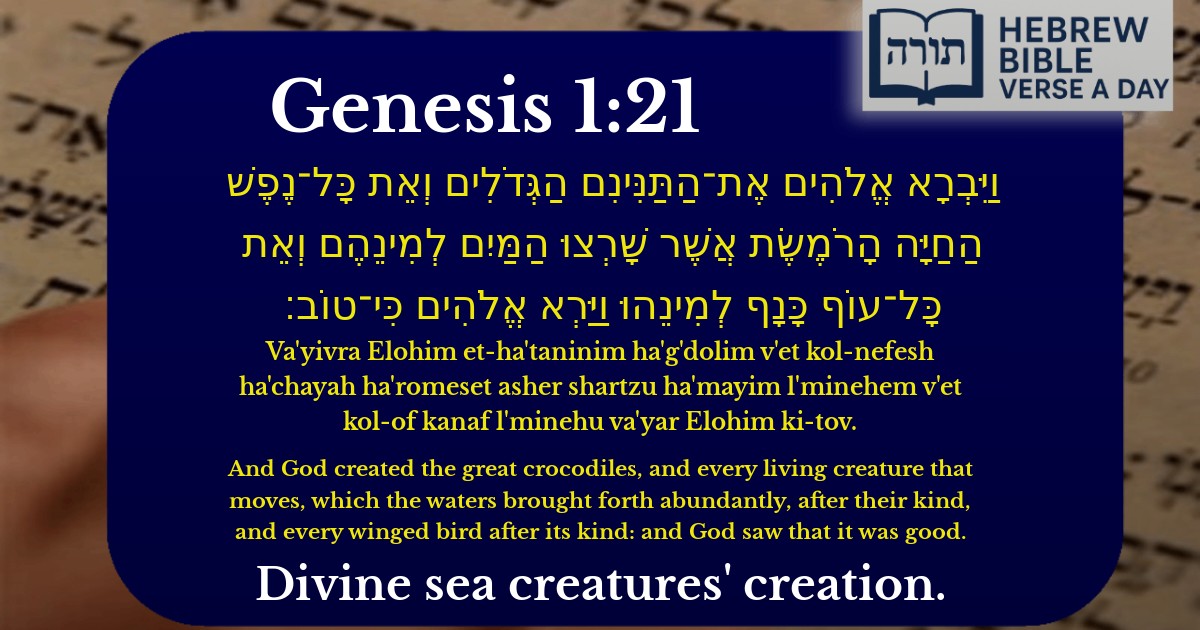Join Our Newsletter To Be Informed When New Videos Are Posted
Join the thousands of fellow Studends who rely on our videos to learn how to read the bible in Hebrew for free!
Hebrew Text
וַיִּבְרָא אֱלֹהִים אֶת־הַתַּנִּינִם הַגְּדֹלִים וְאֵת כָּל־נֶפֶשׁ הַחַיָּה הָרֹמֶשֶׂת אֲשֶׁר שָׁרְצוּ הַמַּיִם לְמִינֵהֶם וְאֵת כָּל־עוֹף כָּנָף לְמִינֵהוּ וַיַּרְא אֱלֹהִים כִּי־טוֹב׃
English Translation
And God created the great crocodiles, and every living creature that moves, which the waters brought forth abundantly, after their kind, and every winged bird after its kind: and God saw that it was good.
Transliteration
Va'yivra Elohim et-ha'taninim ha'g'dolim v'et kol-nefesh ha'chayah ha'romeset asher shartzu ha'mayim l'minehem v'et kol-of kanaf l'minehu va'yar Elohim ki-tov.
Hebrew Leining Text
וַיִּבְרָ֣א אֱלֹהִ֔ים אֶת־הַתַּנִּינִ֖ם הַגְּדֹלִ֑ים וְאֵ֣ת כׇּל־נֶ֣פֶשׁ הַֽחַיָּ֣ה <small>׀</small> הָֽרֹמֶ֡שֶׂת אֲשֶׁר֩ שָׁרְצ֨וּ הַמַּ֜יִם לְמִֽינֵהֶ֗ם וְאֵ֨ת כׇּל־ע֤וֹף כָּנָף֙ לְמִינֵ֔הוּ וַיַּ֥רְא אֱלֹהִ֖ים כִּי־טֽוֹב׃
וַיִּבְרָ֣א אֱלֹהִ֔ים אֶת־הַתַּנִּינִ֖ם הַגְּדֹלִ֑ים וְאֵ֣ת כׇּל־נֶ֣פֶשׁ הַֽחַיָּ֣ה ׀ הָֽרֹמֶ֡שֶׂת אֲשֶׁר֩ שָׁרְצ֨וּ הַמַּ֜יִם לְמִֽינֵהֶ֗ם וְאֵ֨ת כׇּל־ע֤וֹף כָּנָף֙ לְמִינֵ֔הוּ וַיַּ֥רְא אֱלֹהִ֖ים כִּי־טֽוֹב׃
🎵 Listen to leining
Parasha Commentary
📚 Talmud Citations
This verse is quoted in the Talmud.
📖 Chullin 127a
The verse is referenced in a discussion about the creation of sea creatures and the categorization of animals.
📖 Bava Batra 74b
The verse is mentioned in the context of discussing the great sea creatures (taninim) and their creation.


The Creation of the Great Sea Creatures (הַתַּנִּינִם הַגְּדֹלִים)
Rashi explains that the term "הַתַּנִּינִם הַגְּדֹלִים" refers to the great sea creatures, specifically the Leviathan and its mate, which were created on the fifth day (Rashi on Bereishit 1:21). The Midrash (Bereishit Rabbah 7:4) elaborates that these creatures were so immense that Hashem had to destroy one of them to prevent them from overwhelming the world, preserving only the male Leviathan for the future feast of the righteous in the World to Come.
Creation According to Their Kinds (לְמִינֵהֶם)
The Torah emphasizes that each creature was created "לְמִינֵהֶם" (according to their kinds). Rambam (Moreh Nevuchim 2:19) explains that this phrase underscores the fixed and unchanging nature of species, reflecting the divine wisdom in creation. The Talmud (Chullin 127a) further notes that this principle extends to the prohibition of crossbreeding different species (Kilayim), reinforcing the boundaries set by Hashem in nature.
The Abundance of Living Creatures (נֶפֶשׁ הַחַיָּה הָרֹמֶשֶׂת)
The phrase "נֶפֶשׁ הַחַיָּה הָרֹמֶשֶׂת" refers to all living creatures that swarm in the waters. The Sforno comments that this includes not only fish but also smaller aquatic organisms, highlighting the diversity and abundance of life created by Hashem. The Talmud (Avodah Zarah 3b) teaches that even the smallest creatures fulfill a purpose in the divine plan.
Birds of the Sky (עוֹף כָּנָף)
The creation of winged birds ("עוֹף כָּנָף") is also mentioned here. Rashi notes that although birds were created from water (like sea creatures), they were later formed from earth as well (Bereishit 2:19). The Midrash (Bereishit Rabbah 12:14) suggests that birds symbolize the connection between heaven and earth, as they dwell in the sky yet depend on the ground.
Divine Approval (וַיַּרְא אֱלֹהִים כִּי־טוֹב)
The verse concludes with "וַיַּרְא אֱלֹהִים כִּי־טוֹב"—Hashem saw that it was good. The Ramban explains that this phrase signifies the completion and perfection of each stage of creation. The Talmud (Megillah 10b) teaches that "טוֹב" (good) refers to the attribute of divine mercy, indicating that creation was infused with kindness and balance.